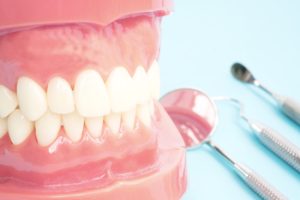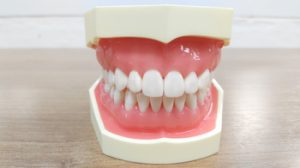Types of Dentures — Determine Which One Is the Best For You

If you’re missing teeth, dentures provide a cost-effective and removable solution to replace them. The type of denture that is best for your situation hinges on how many natural teeth are gone. Let’s take a more thorough glance at the types of dentures that exist today.
What are dentures?
Dentures are artificial teeth that clip onto a base and can be swiftly taken out for cleaning.
 This prosthesis allows you to regain the former form, structure, and function of your bite. As custom dentures take several days to create, we present you with immediate dentures as an interim solution prior to fitting your final set.
This prosthesis allows you to regain the former form, structure, and function of your bite. As custom dentures take several days to create, we present you with immediate dentures as an interim solution prior to fitting your final set.
Here’s a quick guide to help you determine if dentures are right for you:
Evaluate your oral health
With respect to your overall oral health, dentures are an option not to be taken lightly. It is strongly recommended that you first consult with a dentist who can provide an expert assessment of the condition and strength of both your teeth and gums before making any decisions about getting dentures.
Consider lifestyle changes
Prior to deciding on whether or not you should get dentures, carefully consider how the alterations it could bring about in your lifestyle will affect your daily activities, such as eating and speaking. If you rely solely on natural teeth for performing a variety of tasks, having dentures fitted can possibly result in major adjustments.
Consider budget
Dental prosthetics, like dentures, can have a hefty price tag. To ensure that you’re both financially and physically prepared for the process, it’s essential to discuss your costs with your dentist beforehand. Additionally, ask about potential insurance coverage options that could help reduce expenses associated with getting dentures.
Read up on maintenance
It is essential to keep up with proper care and maintenance of your dentures in order for them to be effective and healthy. Make sure you learn the correct cleaning strategies, as well as regular check-ups that are required so they stay in optimal condition over time.
Taking the plunge to get dentures should be a personal decision that takes into account each element in order to guarantee an informed and suitable choice based on your specific objectives and requirements.
Types Of Dentures
Conventional dentures sit above your gum line. The artificial teeth are usually made from acrylic and are designed to match the size, shape and colour of your natural teeth. It may take a few days to adjust to wearing your denture, but once you are used to it, you will be able to eat comfortably and smile with confidence.
Sometimes patients find that complete or partial dentures move around too much and do not offer enough stability. In these cases, it is possible to hold your denture in place using a dental implant. These are known as implant-retained or implant-supported dentures.
What is a complete denture?
Complete dentures, also known as full dentures, are a type of prosthesis used to replace missing teeth. They can be either partial or full, depending on the number of teeth to be replaced. Complete dentures are made from acrylic resin, and they fit over the existing healthy gums and jawbone to replace the missing teeth. They provide support for facial structure and help with chewing, speaking, and smiling.
What is a partial denture?
Partial dentures are removable dental prostheses used to replace missing teeth. They consist of a metal framework that attaches to existing natural teeth and holds artificial teeth in place. Partial dentures can be made from both acrylic resin and cast metal, depending on the patient’s needs and preferences. Partial dentures can help restore the appearance of a smile, support the remaining natural teeth, improve speech and aid in chewing and digesting food efficiently.
What is an implant-supported denture?
Implant-supported dentures are dental implants that are used to secure a full set of dentures in the upper or lower jaw. They provide stability and support for removable dentures, allowing the patient to eat, speak, and smile confidently. Implant-supported dentures are typically made of metal and can be either screw-retained or cemented into place. The process of fitting implant-supported dentures begins with an assessment by a dentist to determine the number and type of implants that are needed. The next step is the placement of the implants into the jawbone, which is typically performed under local anesthesia. Finally, after several weeks of healing time, custom-fabricated dentures will be placed onto the implants to complete the treatment.
When is immediate denture used?
Immediate dentures are removable ones placed in the mouth immediately after tooth extraction, allowing the patient to have a complete set of teeth all at once. Immediate dentures have their advantages and disadvantages – they provide an immediate improvement in appearance and function but may require frequent adjustments. They can take some time to get used to, with potential discomfort and difficulty speaking or eating, until they become settled over time.
10 pros and cons of dentures
 Pros:
Pros:
- Easy replacement teeth, restoring speech and chewing ability.
- Affordable option to replace multiple missing teeth.
- Can provide a natural-looking smile.
- Easy to care for with regular brushing and cleaning solutions.
- Easily adjustable, allowing for a more comfortable fit.
Cons:
- May interfere with taste sensations.
- Over time, dentures can become loose or ill-fitting and may require re-adjustment or relining of the dental plates.
- They can put additional strain on the facial muscles that support them, leading to pain and discomfort when speaking or eating.
- Denture wearers must continue to follow proper oral hygiene practices, such as daily brushing of their gums and tongue—a step that many overlook.
- Regular replacement may be needed due to changes in mouth shape caused by aging or illness.
- Certain foods, such as hard candy, corn on the cob, steak, etc., are difficult to eat with dentures due to their firm texture or size.
- Depending on your age, you may need additional support, like dental implants, in order to keep your dentures secure while eating or talking so they don’t slip or move around in your mouth.
How to take care of dentures?
Protecting your dental appliances is essential, as they are vulnerable to damage if not handled with care. To ensure their safety and longevity, here are some tips:
- When handling the appliance, be sure to use caution and be delicate with your gums and other mouth tissues. Always remember to insert or remove it gently.
- Do not attempt to adjust the fit of this appliance personally – entrust your dentist with this responsibility instead. Poor adjustments may lead to harm being inflicted both on teeth and gums, so it’s best to leave things in their capable hands.
- Boiling temperatures can cause irreversible damage to dentures, resulting in costly repairs or replacements. To avoid any harm to your dentures, be sure you never use hot water.
- When you aren’t wearing your dentures, ensure they are safely tucked away in a secure container, far out of reach from children and pets. Additionally, make sure to store them in water or a specialised cleaning solution for dentures to keep them hydrated and fresh.
- If your dentures break, it can leave you feeling helpless and exposed until you’re able to get them repaired. Glue might seem like an easy solution at first glance, but it is actually a short-term fix that may make matters worse if the denture breaks again. For this reason, consider having a backup set of dentures made so that in case your current ones are lost or broken beyond repair, you don’t have to go without teeth any longer than necessary.
Following these simple steps can help you keep your denture appliance in great condition, giving you many years of comfort and enjoyment.
How long do dentures last?
Dentures can serve you faithfully for about five to eight years before needing replacement due to your mouth and gum shape-shifting. To guarantee the maximum comfort and fitting of dentures, use a reliable adhesive product and consider relining them every few years, even when there has been minimal change in your dental anatomy – this small action will make all the difference.
Get high-quality and affordable dentures at My Local Dentists
Do you have a gap in your smile or missing teeth? Then don’t wait any longer and contact My Local Dentists for the ideal solution to this problem. We offer state-of-the-art dentures at an unbeatable price, making them incredibly cost-effective. Don’t miss out on this great opportunity – call us now to book your appointment and see how quickly we can make a difference.
References
Dental health and dentures
https://www.webmd.com/oral-health/dental-health-dentures#:~:text=Two%20types%20of%20dentures%20are,when%20some%20natural%20teeth%20remain.
False teeth: What you should know
https://www.healthline.com/health/false-teeth
